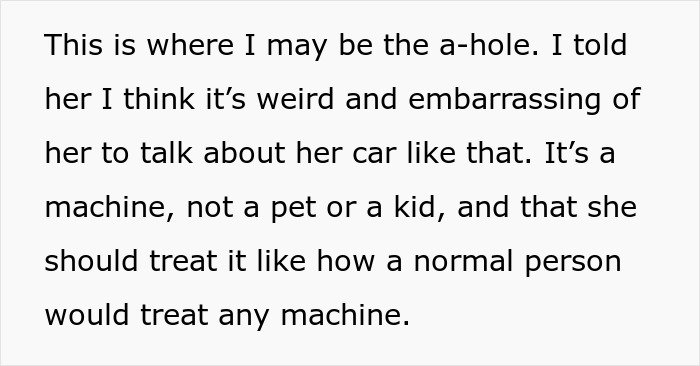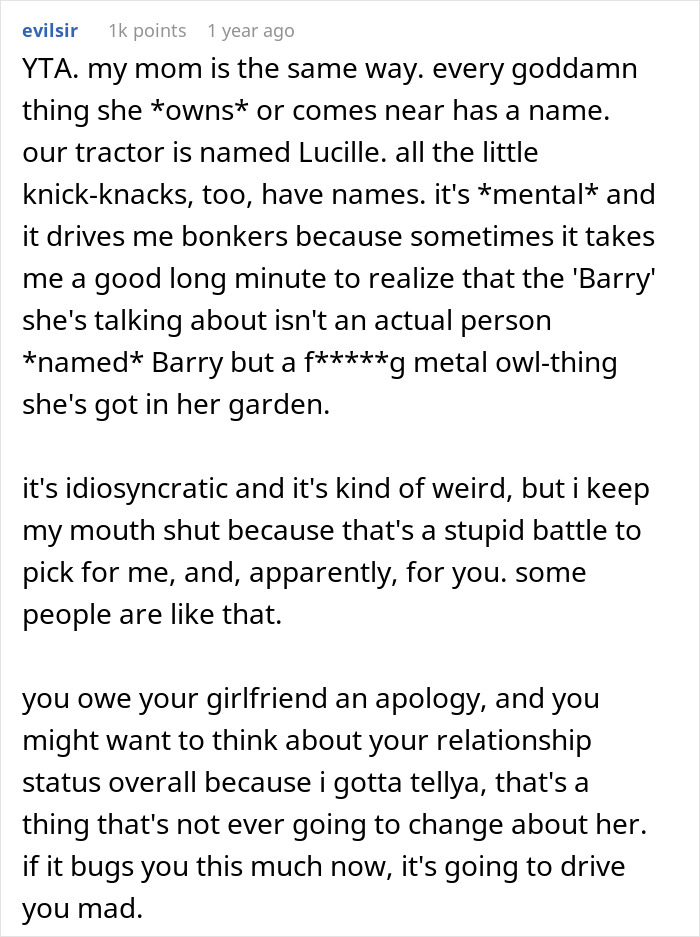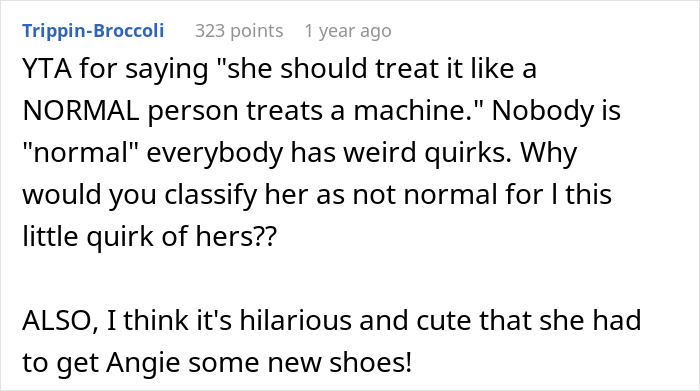People like to give inanimate objects names. I named my guitar Zac when I was 14, for example. Others even talk to their beloved things and treat them like a human, and there’s hardly anything wrong with that, right? Well, to some, it might seem just like a harmless quirk. But others think these people are weird and their behavior is embarrassing.
Like this boyfriend, who called out his girlfriend for treating her car, Angie, like a person, saying that she’s being “weird” and “embarrassing.” Perhaps he has been reading too much Stephen King recently? Either way, when she went radio silent, he started wondering if he maybe acted like a jerk.
Bored Panda got in touch with an expert who studies the human mind, Adam Waytz, Ph.D. He is a professor and psychologist at Northwestern University’s Kellogg School of Management, and he kindly agreed to tell us more about why people like to attribute human qualities to objects, and how that can affect relationships.
Some people have a silly quirk of treating inanimate objects like people

Image credits: Kenny Gaines / unsplash (not the actual photo)
One boyfriend told his girlfriend he didn’t like the way she treated her car like a person



Image credits: Karolina Grabowska / pexels (not the actual photo)



Image credits: Andres Ayrton / pexels (not the actual photo)



Image credits: Ok-Disk-5109
Anthropomorphizing is quite a natural behavior
People give names and talk to their possessions or animals quite often. The scientific term for this is anthropomorphism – giving human-like qualities to a non-human entity. Many people do this in childhood: they talk to their toys and pets, give them names, and generally treat them like a person.
The world’s leading expert on anthropomorphism, Nicholas Epley, claims that while some people may put down those who talk to their possessions, this feature is exceptional to humans and is a testament to our intelligence.
“Historically, anthropomorphizing has been treated as a sign of childishness or stupidity, but it’s actually a natural byproduct of the tendency that makes humans uniquely smart on this planet,” the professor of behavioral science at the University of Chicago said.
Adam Waytz, a researcher on anthropomorphism, tells Bored Panda there are three main reasons why people do it.
- When people are trying to make sense of the world,
- when people are seeking social connection,
- or when people observe a nonhuman thing that looks humanlike, they are more likely to anthropomorphize.
Essentially, it’s because the non-human entity either has a human-like face, we want to be friends with it, or we just can’t explain its behavior. We’re especially prone to anthropomorphize an object if it has eyes.
“Fake eyes are a trick we fall for almost every time—one that can dupe us into seeing a mind where no mind exists,” Epley wrote. “As a member of one of the planet’s most social species, you are hypersensitive to eyes because they offer a window into another person’s mind.”
The independent research consultancy Human Futures Studio found similar things. One of their researchers, Shane Saunderson, describes how they asked 125 adults about how and why they give their possessions names. They identified two reasons: they either feel emotionally close to the object, or are looking for ways to describe the object’s inherent characteristics.
Treating your car like a person can be a double-edged sword: it has its benefits and downsides

Image credits: Andrea Piacquadio / pexels (not the actual photo)
We indeed tend to turn to our pets or inanimate objects for comfort when we’re feeling down. PscyhCentral writes that anthropomorphizing things can fulfill a social need. When we’re feeling lonely or sensitive, we might want to spend time with our pets, like talk to them. A plushy can also give us comfort, more so if we give it a name and attribute emotions to it.
The psychology behind it is that we then relate to that object or person better. Researchers proved this in a 2021 study, where they found that when people attributed human qualities to nature, they were more likely to care about wildlife conservation.
However, in the case of pets, anthropomorphism can have negative effects too. Researchers found that misunderstandings happen when we tend to treat our pets like people. The thing is that dogs don’t operate like humans do, so trying to explain their behavior in human terms would be wrong.
No, your dog isn’t bringing you the ball because he’s sassy and mad at you. Maybe he just saw a bird or needs more training to do that. That’s why researchers caution people that giving pets human characteristics can lead to instances where it harms their needs and interests.
Adam Waytz tells us that, in the end, human connection has the best benefits for us. “Nonhuman entities may be able to provide social connection, but there is no substitute for a real live human being, so getting too attached to a nonhuman might deprive you [of] the social connection you really need.”
People were quick to call out the boyfriend, pointing out that he was the weird one here






















